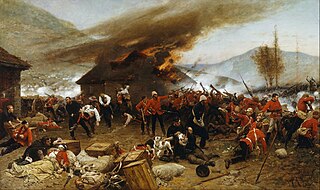
The Battle of Rorke's Drift, also known as the Defence of Rorke's Drift, was an engagement in the Anglo-Zulu War. The successful British defence of the mission station of Rorke's Drift, under the command of Lieutenants John Chard of the Royal Engineers and Gonville Bromhead, of the 24th Regiment of Foot, began once a large contingent of Zulu warriors broke off from the main force during the final hour of the British defeat at the day-long Battle of Isandlwana on 22 January 1879. They traveled 6 miles (9.7 km) to attack Rorke's Drift later that day and continuing into the following day.
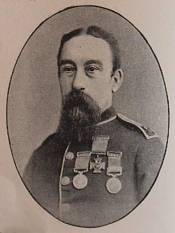
William Jones was a British recipient of the Victoria Cross for his action at the Battle of Rorke's Drift in January 1879, the highest and most prestigious award for gallantry in the face of the enemy that can be awarded to British and Commonwealth forces.

Zulu is a 1964 British epic adventure action war film depicting the Battle of Rorke's Drift between a detachment of the British Army and the Zulu in January 1879, during the Anglo-Zulu War. Some 150 British soldiers at a remote outpost, 30 of whom were sick and wounded, held off a force of 4,000 Zulu warriors.
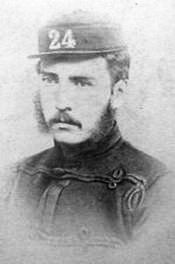
Major Gonville Bromhead VC was a British Army officer and recipient of the Victoria Cross, the highest award for valour in the face of the enemy that can be awarded to members of the British armed forces. He received the medal for his part in the defence of Rorke's Drift in January 1879, in which a small British garrison of 139 soldiers successfully repulsed an assault by some 4,000 Zulu warriors. Bromhead was portrayed by Michael Caine in the film Zulu, which depicted the battle.

William Wilson Allen, VC was an English recipient of the Victoria Cross (VC) for his actions at the Battle of Rorke's Drift in January 1879, the highest and most prestigious award for valour in the face of the enemy that can be awarded to British and Commonwealth forces.

John Williams was a Welsh recipient of the Victoria Cross, the highest and most prestigious award for gallantry in the face of the enemy that can be awarded to British and Commonwealth forces.

Christian Ferdinand Schiess VC was a Swiss recipient of the Victoria Cross, the highest and most prestigious award for gallantry in the face of the enemy that can be awarded to British and Commonwealth forces. He died in poverty at just 28.
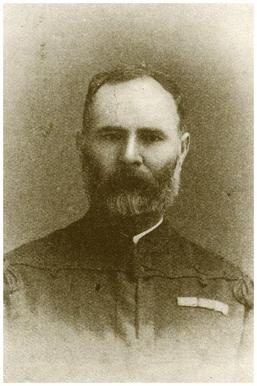
James Langley Dalton VC was an English recipient of the Victoria Cross, the highest and most prestigious award for gallantry in the face of the enemy that can be awarded to British and Commonwealth forces for service at the Battle of Rorke's Drift during the Anglo-Zulu War.
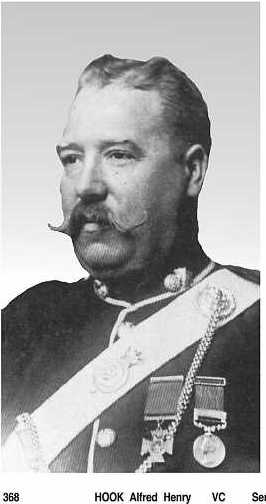
Alfred Henry "Harry" Hook VC was an English recipient of the Victoria Cross, the highest and most prestigious award for valour in the face of the enemy that can be awarded to British and Commonwealth forces, for his actions at the Battle of Rorke's Drift.

Nevill Josiah Aylmer Coghill VC was an Irish officer in the British Army and recipient of the Victoria Cross, the highest and most prestigious award for gallantry in the face of the enemy that can be awarded to British and Commonwealth forces.

Frederick Hitch, VC was an English recipient of the Victoria Cross for his actions at the Battle of Rorke's Drift, the highest award for gallantry in the face of the enemy that can be awarded to British and Commonwealth forces.
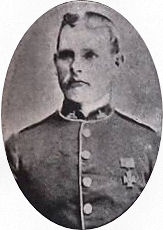
Robert Jones VC was a Welsh recipient of the Victoria Cross for his actions at the Battle of Rorke's Drift in January 1879, the highest and most prestigious award for gallantry in the face of the enemy that can be awarded to British and Commonwealth forces.
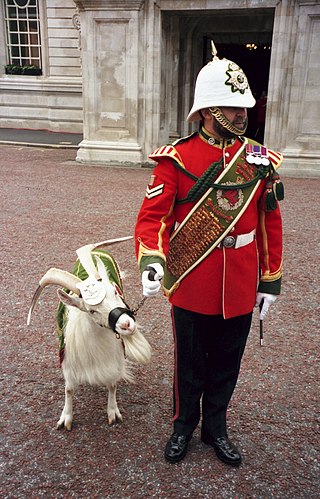
The Royal Regiment of Wales was an infantry regiment of the British Army, part of the Prince of Wales' Division. It was formed in 1969 by the amalgamation of the South Wales Borderers and the Welch Regiment. The 1st Battalion, The Royal Regiment of Wales had a short existence in military terms, just over 36 years. Within two months of amalgamation, the battalion was one of the first units to be deployed to Northern Ireland.

The South Wales Borderers was a line infantry regiment of the British Army in existence for 280 years.

Blaina is a small town, situated deep within the South Wales Valleys between Brynmawr and Abertillery in the unitary authority of Blaenau Gwent, ancient parish of Aberystruth, preserved county of Gwent and historic county of Monmouthshire. The place name is derived from the Welsh word blaenau "uplands". As of 2011, the town has a population of 4,808.

'Padre' George Smith, an army chaplain, was a defender of Rorke's Drift during the Zulu War of 1879, an action which saw the awarding of eleven Victoria Crosses.

The Regimental Museum of The Royal Welsh, formerly the South Wales Borderers Museum, is located at Brecon in Wales. The museum's collection is made up of artefacts collected from a variety of sources from around the world and which display the regiment's 300-year history.
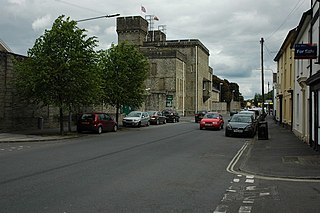
The Barracks, Watton is a military installation in Brecon in Wales.

Private Thomas Collins of Pelcomb, Camrose in the county of Pembrokeshire, Wales was a participant in the battle of Rorke's Drift which took place 22–23 January 1879. During this battle, the 24th regiment of foot fought and resisted a force of at least 4,500 Zulu warriors leaving 17 British dead and 10 wounded, along with 450 dead Zulu warriors.

Lt Gen Richard Thomas Glyn was a British Army officer. He joined the 82nd Regiment of Foot by purchasing an ensign's commission in 1850. Glyn served with the regiment in the Crimean War and rose in rank to captain before transferring to the 24th Regiment of Foot in 1856. He served with that regiment in the Indian Mutiny and was appointed to command it in 1872. In 1875 he accompanied the 1st battalion of the regiment on service in the Cape Colony and fought with them in the 9th Cape Frontier War of 1877–78. He was appointed a Companion of the Order of the Bath after the war.


















